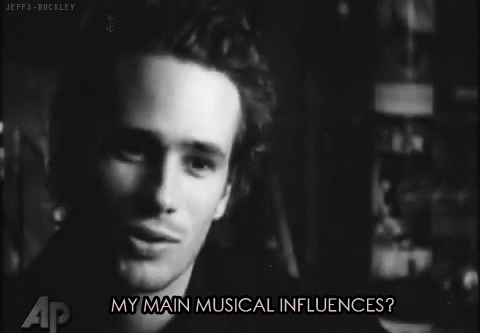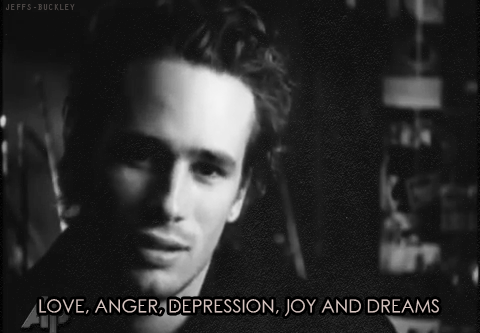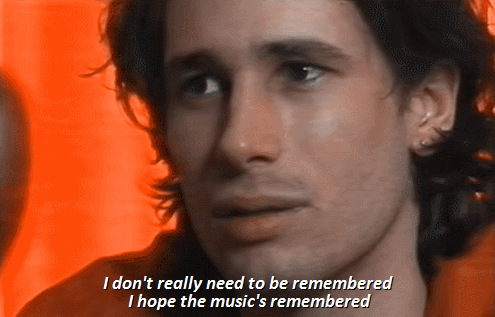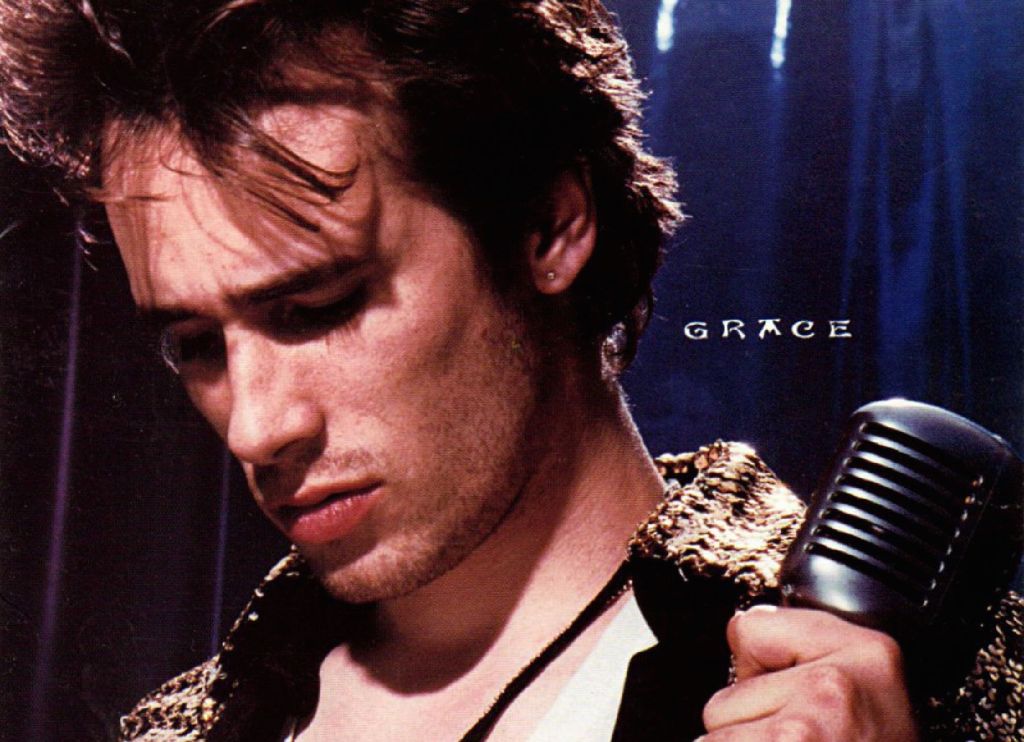Greetings groovers welcome back to Music Feeds’ bi-monthly record club where we kick back with a glass of vino and go deep with the classic cuts no long-playing lover should be without. Now please prepare your emotions, ‘cos today’s record is guaranteed to hit you in the feels.
The Snapshot
Like his voice, the sheer drama of Jeff Buckley’s life was captivating. The son of a genre-pushing folkie who overdosed at age 28, Jeff spent his life dodging impossibly high expectations. He was forever shadowed by the spectre of a father he had hardly known.
When he finally found the confidence to share his irrepressible talent with the world, the staggering artistry of his debut saddled him with greater expectations still. Yet as he struggled to follow on from his debut’s success, Jeff’s life was cut short. His departure at age thirty was no archetypical explosion of sex, drugs and rock and roll, but a senseless death brought on by nothing more than his own impulsive nature.
As a veteran performer of dive bars and coffee shops, Buckley arrived armed with the ability to bring an audience to tears. Whether playing covers or his own originals, Jeff’s music was littered with breathtaking torrents of tortured emotion and virtuosic flair. A consummate entertainer, his proclivity for excess and exaggeration coursed throughout his personality on and off of the stage.
His first and only album, Grace was a flash of brilliance. It introduced an artist who was assuredly destined to stretch popular music’s form and conventions to their limits. Grace unfurls as a mesmeric and unpredictable performance. A taste of Buckley’s intuitive spontaneity, flirtatiousness, whimsy, gut-wrenched emotionality and vigour. But what was set to be a promising trilogy ended as his one-album legacy. With his death, Grace became the dark poetry of a life painfully incomplete.
Background
Estranged from his father Tim, Jeff Buckley spent his childhood with his musical mother Mary Guibert. Mechanic Ron Moorhead kickstarted his stepson’s passion for music with a copy of Led Zeppelin’s Physical Graffiti. From here Jeff would frequently flit between influences, but additional discoveries Van Morrison, Robert Johnson, The Smiths, Patti Smith, Bobby Dylan, Nusrat Fateh Ali Khan, Elton John, Billie Holiday and Duke Ellington would remain close to his heart. The young Buckley was ambitious, he saw the gifts of these musical idols and wanted to take them for himself.
Leaving home at 17 he drifted through life playing in a series of LA groups before departing for New York in 1990. He would involve himself in a number of projects but also cut out as a solo artist. Falling in with the city’s art circle after appearing as part of a 1991 tribute to his father, Jeff’s star began to rise.
Buckley landed a regular spot at Irish bar Sin-é as it grew into one of the city’s hippest venues. He recorded a live EP but was still performing a repertoire of mostly covers. Word spread throughout 1991 and by ’92 major label interest began to swell. As Buckley continued to floor his audiences, the New York industry was steadily tacking onto his remarkable story, talents and star quality. After a small bidding war, he signed with Columbia just before the close of ’93.
Having been urged to make good on his bright promise with a debut album, Buckley assembled a band and began recording at Bearsville Studios in Woodstock. His choice of producer was Andy Wallace. Wallace was hot property and highly sought after due to his mixing of Nirvana’s Nevermind. Preparing to share his songwriting with the world, Buckley was overflowing with ideas. Yet he was equally unpredictable. Over the six weeks that they recorded, Wallace was tasked with keeping three different band setups available at all times to accommodate Buckley’s spontaneous moods.
Within the studio, Buckley curved intuitively through a core of jazz, r&b and rock. With the assistance of Wallace and a potent backing band, he captured eleven tracks, making them cohere into a single work of intensely personal and stunningly original music. When it dropped in 1994, Grace met instantaneous acclaim.
Buckley had strong feelings about his music. He wanted to impress something new and original upon the world. He had achieved this with Grace and was beginning to envision a trilogy of albums. Yet as the two years following Grace wore on, pressure from extensive touring, a falling out with partner Rebecca Moore and his label’s demands for an equally stellar follow-up, saw Buckley stricken with prolonged writer’s block.
Despite his confident debut, he was still just a boy grasping at the person he wanted to be. In a bid to dissolve this mounting tension, Buckley scrapped what money he could and retreated to Memphis at the beginning of 1997. Renting a rundown shack, he spent his time in isolation. Occasionally he emerged from seclusion to mill around with new acquaintances, road test material in local clubs, and sporadically work with his band to record demos.


Why Own It on Vinyl?
1. It’s Been 20 Years
It’s been 20 years since Jeff Buckley took his fateful evening stroll into a fast-flowing industrial waterway on the outskirts of Memphis. Fully clothed singing Led Zeppelin’s ‘Whole Lotta Love’, Buckley grinned as he sloshed around its the shallows. Roadie and fellow musician Keith Foti looked on. He wasn’t impressed but shrugged it off as another one of Jeff’s typically impulsive follies. Foti manned his boombox on the shoreline as Buckley backstroked further toward the centre of the murky channel.
After an earlier close call with a passing boat, the heavy wake of a larger tug swept Buckley’s slender frame beneath the water and into a fast-flowing current. With the small river’s undertow went one of the most promising talents of the generation.
2. The Australian Connection
Despite Grace’s critical acclaim, the album’s initial sales were modest at best. Its cult-like reception within the US stands in stark comparison to the ecstatic reaction Down Under. More so than anywhere else in the world, Australians were ready to recognise and connect with Buckley’s formidable talent. Here Jeff Buckley wasn’t just received as a cult artist but as a star.
Alternative bastions triple j and Melbourne’s 3RRR were quick to champion Grace and it remained on the ARIA charts fifty-two weeks following its release. It even hit into the top ten, peaking at number nine. With some heavy airplay anticipating his 1995 national tour, Buckley’s club concerts sold out within 15 minutes of going on sale. Buckley would remain in Australia from August 28 to September 6 that year. Those left in any doubt were quickly won over as further sales saw Grace shooting to Gold record status, a milestone it had yet to achieve in Buckley’s home country.
Buckley would return again at the start of ’96 to play bigger venues. The tour dates included three consecutive nights at both Sydney’s Enmore Theatre and Melbourne’s Palais. To date, Grace has gone to sell 6x Platinum and shifting more than 490,000 copies domestically.
3. The Covers
Jeff Buckley could instil new life in anything he wrapped his vocal chords around. He was gifted with a near photographic memory for songs. If something twitched his antennae he would commit it to memory on the spot. Playing with instantaneous recall he would ad lib during his performances, often quoting snippets of his favourite artists’ vocals or guitar lines at will.
Buckley also had an uncanny knack for inhabiting these other’s songs. Grace includes three unlikely covers, a bleakly soulful take on Nina Simone’s ‘Lilac Wine’, Leonard Cohen’s ‘Hallelujah’ and Benjamin Britten’s ‘Corpus Christie Carol (For Roy)’. Delivered with a hymnlike devotion, Jeff bewitches these originals with his own sinuous vocals, warping them almost beyond meaning and recognition.
https://youtu.be/2YjbJTS5C_I
Fun Fact
Let it be known that Jeff Buckley cut his teeth in a reggae group. During his formative period in LA, he lent his talents as a guitarist to The AKB Band. Ultimately his tenure didn’t amount to much besides operating as a pickup band for U-Roy, Shinehead and one-time Bob Marley associate Judy Mowatt. He would also assist his bandmates doing what he described as “cheesy session work.” DespiteBuckley’s musical flair, he reportedly struggled to master the backbeat and overall simplicity of the reggae form.
Key Tracks
‘Mojo Pin’ – Originally written alongside title track ‘Grace’ during Jeff’s brief tenure with Captain Beefheart outgrowth Gods and Monsters, ‘Mojo Pin’ is an all-out bid to pull you in. Bringing the brunt of his vocal talents to bear Jeff releases relentless torrents of tender falsetto, holding notes for up to eight seconds at a time. The opener recounts the narrative of an inter-racial romance cloaked in instrumental texture and delicate guitar bends. It smoulders with brooding desolation.
‘Hallelujah’ – Buckley doesn’t inhabit this song, he makes it his own. Jeff first came across the song, not as a Leonard Cohen original but as a cover The Velvet Underground’s John Cale contributed on a 1991 compilation I’m Your Fan. Becoming fixated with the track, he interpreted it as a wisened story of profane and earthly love. The sixth track of Grace, it’s a song the listener almost doesn’t want to arrive. Yet when it does, it’s every bit as overpowering as when it as when it first etched itself to memory. Enveloping the track’s simple arpeggios, Jeff Buckley’s voice threatens to smother everything it surrounds. Ache and emotion are hanging off of every note. His lyrics tumble out in uninhibited streams of overpowering emotion.
‘Last Goodbye’ – For all of Grace’s complexities, the album’s third cut arrives disarmingly simple. With its lyrics straightforward and rhythms choppy, many contend it calls back to Tim Buckley’s ‘Sweet Surrender’. Regardless, Jeff wallows in lovesick melancholy. There’s a sense of desperation which doesn’t just pull at the heart, it lunges in and tears it apart.
https://youtu.be/cU7GNlfMKhU
Legacy
In his own time, Buckley was a contender, a fast-living musical prodigy who created emotionally resonant music. He seemed destined to win over the hearts and minds of a generation. His accidental death pushed his music into the collective conscious. Following his passing, his name would be ushered in on the same breath as Jimi Hendrix, Jim Morrison and Janis Joplin. Grace saw Buckley arriving as a complete and otherworldly package, but the true seduction of his music lay within the promise of its future.
Jeff Buckley left this world unexpectedly and far too early. The aftershock of his death moved many contemporaries and cast a long shadow on the music of the ensuing decade. Liz Fraser was reportedly midway through writing the lyrics to Massive Attack’s ‘Teardrop’ when she heard news of his death. PJ Harvey would commemorate Buckley with ‘Memphis’ in 2001. Radiohead’s Thom York, Bat For Lashes, Sia, Muse’s Matt Bellamy, Adele, Lana Del Ray and, yes, Coldplay, all owe a debt of gratitude to Jeff Buckley’s’s pioneering sound.
Let’s Reiterate: Why Own It on Vinyl?
Two decades since his passing, Buckley’s music remains potent. So many albums embody the moment at which they arrive but quickly fade into something obsolete. Unlike so many of Jeff Buckley’s contemporaries, the years have been kind to Grace. Buckley’s debut bucked the expectations of its time and as a result, owes no allegiance to the decade from which it comes.
Jeff Buckley was an individual so possessed by music the two are almost impossible to unbind. Every moment of Grace is not just a vivid expression of craft but the personality of the artist himself. Within Grace’s vinyl grooves sit echoes of his life and the driving passions it entailed.

To experience this first hand, head here.
Best Enjoyed With…
Purists can continue tracing Jeff Buckley’s musical legacy through a series of posthumous releases. While rumoured to have been slated for ritual cremation by their dissatisfied creator, the demo recordings of Sketches for my Sweetheart the Drunk offer a hint of what may have come next. Mystery White Boy follows on, commendably documenting Buckley’s live sound. There are a host of other box sets, re-issues and compilations, but overall this output may leave the listener feeling like they’ve been handed something a little incomplete.
Tracing Jeff Buckley’s musical influences within the recordings of his above-mentioned acolytes and antecedents comes more recommended. Yet this shouldn’t displace the idea that Grace is a classic album. It stands up by itself. Play it alongside the other all-time greats.
Browse the full Viva La Vinyl catalogue and start beefing up your own collection right here.














